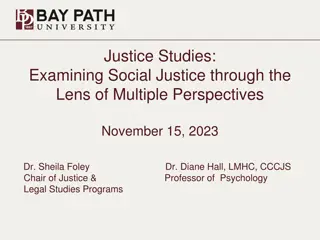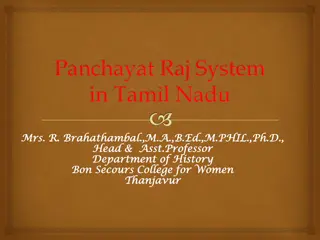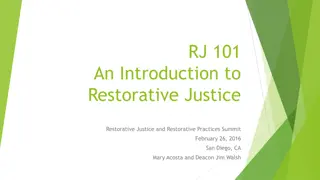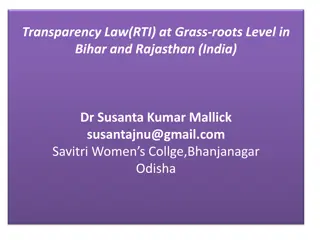Gram Nyayalayas: Enhancing Justice at the Grassroots Level in India
Indian Criminal Justice System has evolved over the years to ensure justice reaches every individual efficiently. The introduction of Gram Nyayalayas represents a significant step towards this goal by establishing formal mobile courts in villages. These courts aim to enhance access to justice and promote speedy resolution of disputes, building upon the traditional Nyaya Panchayat system. Gram Nyayalayas Act of 2008 replaced the informal village-based Nyaya Panchayat with formal mechanisms, striving to provide fair and effective justice at the grassroots level in India.
Download Presentation

Please find below an Image/Link to download the presentation.
The content on the website is provided AS IS for your information and personal use only. It may not be sold, licensed, or shared on other websites without obtaining consent from the author. Download presentation by click this link. If you encounter any issues during the download, it is possible that the publisher has removed the file from their server.
E N D
Presentation Transcript
LL.M. SEMESTER II COURSE CODE : 201c COURSE TITLE : LAW AND SOCIAL TRANSFORMATION IN INDIA UNIT V : ALTERNATIVE APPROACHES TO LAW 5.3 GRAM NYAYALAYAS TOPIC : GRAM NYAYALAYAS AND INDIAN CRIMINAL JUSTICE SYSTEM Presented by Dr. Sangeeta Chatterjee Assistant Professor Department of Law, Bankura University
INTRODUCTION Indian Criminal Justice System is subjected to the pattern of law and social change. It is an age-old system, started from the ancient Hindu period, witnessed the changes brought by the Muslim emperors in the medieval period, followed the transformations introduced by the British government in the pre-independence era and finally absorbed new techniques announced by the Indian government in the post- independence era. All the changes brought about are nothing but to establish the criminal justice system in a much scientific manner, so that justice can reach at every door step easily as well as speedy and expeditious way of justice can be achieved. Establishment of Gram Nyayalayas is a part and parcel of that initiative and a movement towards that direction.
BACKDROP Predecessor of Gram Nyayalayas, the village based system of Nyaya Panchayat was the oldest method of providing criminal justice at the grass root level of Indian society. It was an informal court system controlled by the village panchayat, wherein decision was usually given by way of mediation or negotiation. Though it had limited power and no such legal sanctity, but sometimes it used to exceed its jurisdiction and provided capital punishments to the persons accused. This system of Nyaya Panchayat was continued for long in India and was misused severely. In order to change the scenario, Gram Nyayalayas Act was passed in 2008 in India for establishment of formal mobile courts in villages, called Gram Nyayalayas.
WHAT IS NYAYA PANCHAYAT A Nyaya Panchayat is a system of dispute resolution at village level in India. Nyaya Panchayat is the Court of five persons, elected by villagers and out of them one is elected as a Chairman called Sarpanch. In India, Nyaya Panchayat is doing its work fairly, speedily and with noexpenses. All villagers use to respect the decision taken by the Sarpanch. Forfeitures of property, compensation to victim, fine and social boycott are the general punishment according to the seriousness of the act, committed by the offender. form for
PROCEDURE OF NYAYA PANCHAYAT Procedure of Nyaya Panchayat is simple. Where any person is alleged to have committed any immoral act, that person is brought before the Panchayat. There all the persons (including men and women) of that village sit in the presence of all Panchas (bench of selected judges) to decide thecase. In every village there is a selected committee generally separated from the head of village Panchayat (Pradhan). All the witnesses are produced before the Bench by the person who alleged thecrime. On the proof of immoral act, the bench of Panchas decide the immoral act and award them punishmentaccordingly. The Nyaya Panchayat generally give the offender punishment of social boycott for a limited period, which means no one will share with him anyoccasion of happiness and sadness. The punishment of social boycott is equal to imprisonment, because every person of the village is restricted from helping the offender in any way including the primary requirements of the person, i.e. water, food, hukka etc.
ADVANTAGES OF NYAYA PANCHAYAT No doubt, the role of Nyaya Panchayat for delivering cheap and speedy justice at the local level is praiseworthy under Indian Criminal Justice System, because no one can negate that justice can be best delivered when it is delivered by the familiar persons at local level with the efforts of harmonizing the matter between the parties, rather taking it to far away courts in order to increase mud- slinging between the parties. the
DISADVANTAGES OF NYAYA PANCHAYAT It has manydisadvantages, like unknown procedure, exceeding the jurisdiction, miscarriageof justice, non-applicabilityof rules of evidence, jury and judges are not qualified in law, absenceof legal awareness. Nyaya Panchayat can giveonly social and financial punishment. Its award is unenforceable in a court of law. It s working procedure violates Right to Equality under Article 14 of the Indian Constitution, because it works on the basis of caste system, separate Panchayats are created for separate castes and one caste cannot interfere upon the other as well as supremacy of the Khap (Regional Panchayat) is maintained. Social Boycott is also not always similar to imprisonment owing to the fact that, it takes away the basic human rights of food and other necessary means of livelihood, which sometimes leads to the death of the offender, contrary to the system of imprisonment.
WHAT IS A GRAM NYAYALAYA Gram Nyayalayas are mobile village courts in India established under the Gram Nyayalayas Act, 2008. It is established for providing speedy and easy access to justice system in the rural areas of India. Within the terms Gram Nyayalaya, Gram stands for village; Nyay stands for Justice and Aalya stands for House/centre. They are aimed at providing inexpensive justice to people in rural areas at theirdoorsteps. The Act came into force on October 2, 2009 i.e. the birth anniversary of Mahatma Gandhi.
OBJECTIVES OF THE GRAM NYAYALAYAS Access to justice by the poor and disadvantaged remains a worldwide problem. Article 39A of the Constitution direct the State to secure that the operation of the legal system promotes justice, on the basis of equal opportunity and shall in particular provide free legal aid, by suitable legislation or schemes or in any other way, to ensure that opportunities for securing justice are not denied to any citizen byreason of economic orotherdisabilities. To give effect to the said mandate the Government has taken various measures to strengthen the judicial system by simplifying the procedural laws; incorporating various alternative dispute resolution conciliation and mediation, conducting of Lok Adalats etc., establishing Fast Track Courts, Special Courts and Tribunals and providing free legal aid to the poor, women and children. mechanisms, such as arbitration, To provide access to justice at the grass root levels, the Law Commission of India in its 114thReport on Gram Nyayalaya recommended establishment of Gram Nyayalayas so that speedy, inexpensive and substantial justice could be provided to thecommon man. Justice to the poor at the door step is a dream of the common man. Setting up of Gram Nyayalayas which will travel from place to place would bring to the people of rural areas speedy, affordable and substantial justice.
SALIENT FEATURES OF THE GRAM NYAYALAYAS ACT, 2008 The Gram Nyayalaya shall be the Court of Judicial Magistrate of the First Class and its Presiding Officer (Nyayadhikari) shall be appointed by the State Government in consultation with the High Court. The qualifications, salary, terms and conditions of service of the Nyayadhikari shall be the same as that of the Judicial Magistrateof First Class. The Gram Nyayalaya shall be established for every Panchayat at the intermediate level or a group of contiguous Panchayats at intermediate level in a district or where there is no Panchayat at the intermediate level in any State, for a group of contiguous Panchayats. The Gram Nyayalaya shall try criminal cases, which are specified in the First Schedule to the Act. The Gram Nyayalaya shall follow the summary procedure in criminal trials.
SALIENT FEATURES OF THE GRAM NYAYALAYAS ACT, 2008 The judgment and order passed by the Gram Nyayalayas shall be deemed to be decree and to avoid delay in its execution, the Gram Nyayalayas shall follow summary procedure for its execution. A person accused of any offence may file an application for plea bargaining in Gram Nyayalaya in which such offence is pending trial and the same will be disposed of by that Gram Nyayalaya in accordance with the provisions of the Chapter XXIA of the Code of Criminal Procedure, 1973. The Gram Nyayalaya shall be a mobile court and shall exercise the powerof acriminal court. An appeal from the judgment, sentence or order of the Gram Nyayalayas in criminal cases to the extent provided in the Code of Criminal Procedure, 1973 shall lie to the Court of Session, which shall be heard and disposed of within a period of six months from the dateof filing such appeal.
CRITICAL ANALYSIS It is a very effective mechanism for trying criminal cases at the village level throughdoortodoorvisitand by way of conciliation. It is also considered praiseworthy for summary trials of criminal cases as well as disposal of criminal appeals within six months from the date of filing. Establishment of Gram Nyayalayas will decrease the huge number of pending cases atdifferentcriminal courts. But, it can try only the petty cases, where offences under the Indian Penal Code, 1860 shall not be punishable with death or imprisonment for life or the imprisonmentshall notexceed twoyears. In case of theft or stolen property, the value of property shall not exceed twenty thousand rupees. Therefore, for serious criminal cases, the litigants have to move to the courtonly. Sometimes it becomes advantageous also, because Gram Nyayalayas have no scope to exceed their jurisdictions or abuse their powers like the Nyaya Panchayats.
PRACTICAL SITUATION Though the Central Government in India has taken various initiatives to establish throughout thecountry, but the practical situation somewhat different. Most of the State Governments are reluctant to establish Gram Nyayalayas in their States. Only Madhya Pradesh, Maharashtra, Orissa, Haryana, Punjab and Rajasthan have established it. On the contrary, Delhi and Andhra Pradesh have refused to establish it, stating the reasons of urbanisation and effectiveexisting system respectively. Hence, only 208 functional Gram Nyayalayas are found in India against the targetof 5000 till 3rdSeptember, 2019. Gram Nyayalayas is
SUGGESTIONS Financial constraints of State functionaries for establishment of Gram Nyayalayas should be removed. Reluctance of Lawyers and Police Officials to invoke its jurisdiction should be removed. The plea of no need of Gram Nyayalayas at the presence of Fast Track Courts should not be granted. Confusion regarding the jurisdiction of Gram Nyayalayas with Alternative Forums, like Labour Court, Family Court etc. should be removed. General awareness of the common masses regarding the existence of Gram Nyayalayas at the District Court premises should be generated. Conferences and seminars should be organised for creating awareness regarding the advantages of this institution.
CONCLUSION Establishment of the system of Gram Nyayalaya stands upon the maxim Justice delayed is justice denied, which is recognised in overwhelming manner in the case of Hussainara Khatoon vs. Home Secretary, State of Bihar, where the Supreme Court of India has declared that, Right to Speedy Trial is a Fundamental Right under Article 21 of the Indian Constitution. Accordingly, speedy trial is a basic human right also within the purview of right to life and personal liberty. Gram Nyayalayas Act, 2008 is enacted with this noble cause of providing speedy trial and this is the human rights perspective of Gram Nyayalayas. Establishment of these mobile courts should be increased not only to enhance criminal justice system at rural level, but also to protect the human right to life and personal liberty in the form of speedy justice therein. As such, the formation of Gram Nyayalayas at the village levels throughout the territory of India is the urgent need of the hour. Creating of Fast Track Courts will not be enough to fulfil the need of Gram Nyayalayas, because those are not mobile courts and do not follow the method of conciliation. Hence, the State Governments should think about the constitution of Gram Nyayalayas as soon as possible.
REFERENCE : 1. Dr. P. Ishwara Bhatt, Law and Social Transformation, Eastern Book Company, Lucknow, 1stEdition, 2009. 2. Dr. Krishna Pal Malik and Dr. Kaushik C. Raval, Law and Social Transformation in India, Allahabad Law Agency, Faridabad, 4thEdition, 2017.
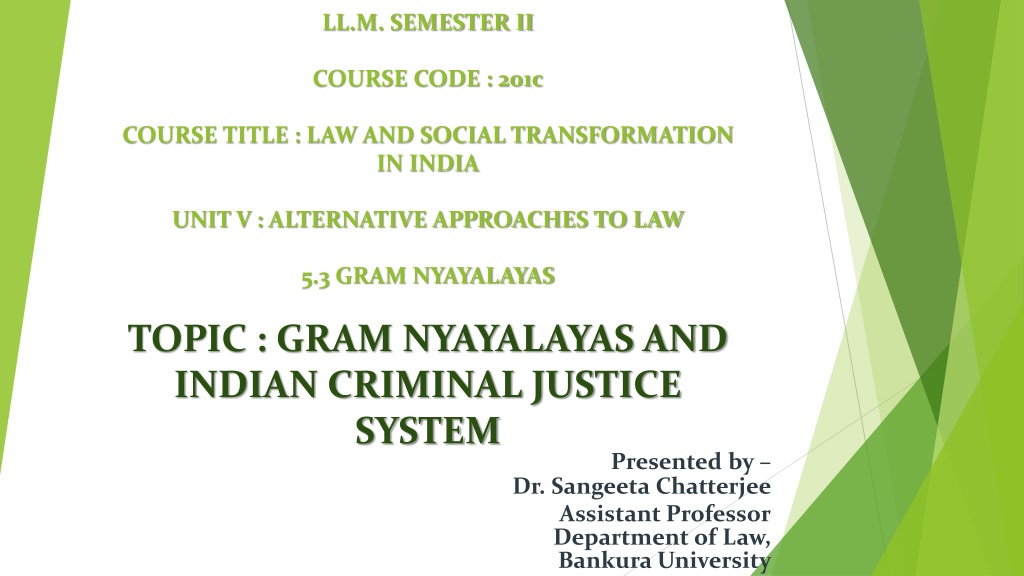
 undefined
undefined










